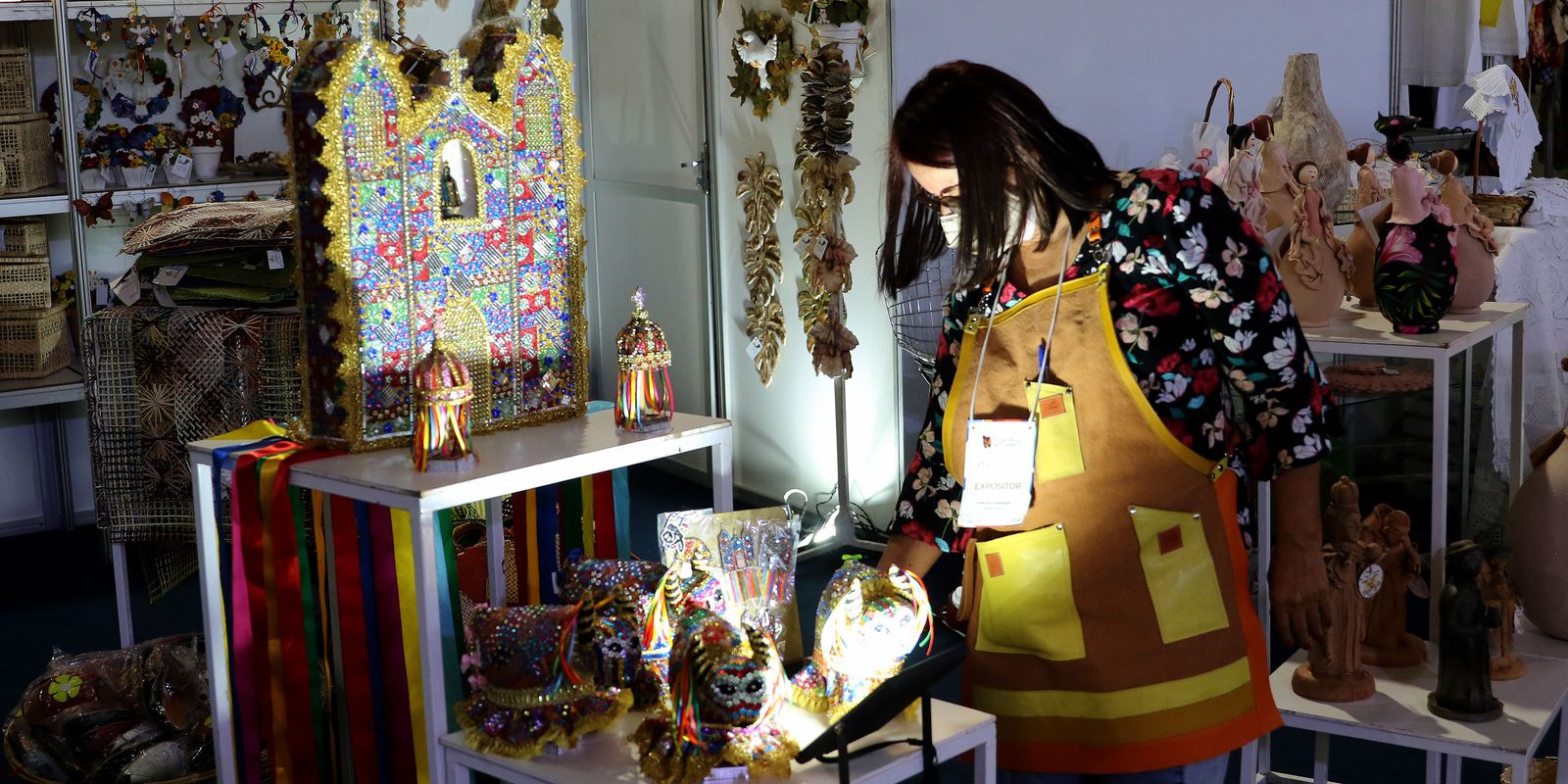The universe of handicrafts was one of the sectors affected by the restrictions imposed by the covid-19 pandemic. But this year, on Craftsmen’s Day, celebrated on March 19, these professionals can celebrate the sector’s growing recovery, say the artisans interviewed by the Brazil Agency.
“People are buying a little less than before the pandemic, but more than they were buying last year, but we understand that the financial moment is not the same. We noticed that the sector has not lost its enchantment. We know that handicrafts are not essential items, we have always had this reality. So, as professionals, we reinvent our product so that people say: it’s not what I need, but it’s a product that I love, so I want to have this product!”, says artisan Edna de Souza Machado Simão, 52, who is also a handicraft teacher and popular educator.
She sees fairs as the best places to sell her products. “We spent a long time doing fairs onlinebut we artisans like to talk about the product to people and the pandemic took that away from us, internet fairs are not the same thing as showing a product, the person being able to touch it, talking about the creative process, of the material you used, the online it is not the same feeling, at fairs, the person is feeling the product”.
Edna is part of Tendarte, a collective enterprise of women in the solidary economy that produces playful and educational fabric toys. It has two partners: Daniela Maria Feliciano da Silva and Maurisa Di Petta.
Maurisa says that during the pandemic, work has decreased a lot. “I was even a little discouraged, now I got excited and I’m feeling growing more with the events that have been arising”, celebrates the artisan, 58 years old, who has been in the business since 2002. She says that the income obtained from the products sold does not make up the family income. “But it’s a moment to see myself grow, to know that I can accomplish anything I want, in addition to introducing family discipline and showing that being a woman and mother is not just being a housewife”.
work and income
Edna claims that the venture does not generate a fixed income, it depends a lot on the events scheduled during the month. “Our house is sustained with income from other people in the family. But, Tendarte is supported by what we do, it has to be based on what we produce. Now it’s getting a little better, the association has a partnership with a mall in Osasco, where they have given us some stores. So we live taking all these opportunities to, in the end, have an income that we can pay the company’s costs, but that we also get income”, explained the artisan, who is still vice-president of the Association of Workers at Home of the Solidarity Economy of Osasco.
“A homeworker is someone who produces at home or close to home, which generates income for the family, that is, they are all craftsmen, since it is difficult for craftsmen to have a studio away from home, usually it is a small room, people who belong to gastronomy, some use their own kitchen, or sometimes it is the table in the living room that is the studio that the person uses to develop their product”, he explained.
Artisan cook Edileuza Guimarães, 42 years old, also from Osasco, is one of those workers who uses the kitchen in her own house and also that of Association of Women in the Solidarity and Feminist Economy (Amesol) to produce artisan food.
“Everything I do is with my hands, I produce food for those with some type of food restriction, special and vegan foods. Just like the traditional ones too, but I like this type of food much more [especial], for those who can no longer eat out. We treat with affection when people with restrictions attend fairs and have a type of food that they can buy, eat calmly and in an artisanal way.”
Better known as Dinha, she says she felt the drop in income during the pandemic. “With the fairs, I manage to earn much more than my husband, who is an employee. But, as my job is to be with people, I suffered a lot with this, it makes all the difference when you show the product. in marketing online, the person is not feeling the transmission of love that one has when one dedicates oneself to preparing that food, in addition, people start to compare their product with others that are made on a large scale, which end up being even a little cheaper. It was a moment of great anguish because when you work on your own, you depend on producing and selling”, said Dinha, who has dedicated herself to cooking for 17 years.
It continues marketing via cell phone and the channel on Instagram. “But fairs are the best sources for people to generate income.”
Recovery, however, is coming slowly, she says. “It is being slow and gradual. It is a job to raise awareness of an entire community about the importance of that fair taking place”.
In the cook’s view, after the pandemic, people are migrating to work as self-employed. “Joining the income generation movement, like us in the solidary economy, generating income collectively, which is the future. Our work is important to recover people who were lost during the pandemic, who lost their formal jobs and joined us. The recovery is being a little difficult, but not impossible”.
Support
The report of Brazil Agency spoke with Maria Fernanda Marcelino, a member of the Semperviva Feminist Organization (SOF) and Amesol, of which Dinha is also a member.
“These women artisans didn’t have a cash flow they could handle. At Amesol we campaigned on the internet to raise funds for these women who stopped holding public fairs and selling their products. And the pandemic took much longer to end than it should have if we had had access to vaccines earlier. What happened was not that, it was the postponement of face-to-face activities, free fairs, events and with that the increasingly accentuated impoverishment of these women”, lamented Maria Fernanda.
In addition to the distribution of resources, raised by the Federal Budget Secretariat (SOF), there was distribution of basic food baskets among the artisans.
The SOF member explains the standard of women artisans in the solidary economy. “Usually they are young women who want to live off what they produce or older women, with children, who are on the margins of formal work and who need to make individual production their source of income”.
For her, the recovery is extremely slow because there is no look at this sector. “There is no public policy, neither financing nor investment that supports these women to earn an income. So the recovery is slow and happens in proportion to the efforts of women, organizations or private initiatives, events that make it possible for these women to sell what they produce, but which also has a drop, because [elas] they have no resources for investment, for the purchase of raw materials. So the recovery, in fact, is quite slow”.
Data
Data from the Undersecretariat for Craftsmanship in the Communities, linked to the Economic Development Secretariat of the State of São Paulo, account for 700 artisans throughout the state, with 80% earning an average of one minimum wage.
As for the profile, 80% are women, 60% white, 60% married, 35% with secondary education, 75% living in urban areas and 55% have a supplementary income from handicrafts.
According to the folder, with regard to public policies, “the programs are being reviewed, so there is no information at this time,” it said in a note.
The artisan profession was regulated in 2015 with the Law No. 13,180. The text defines the craftsman as “the professional who performs a predominantly manual activity, which may rely on the use of tools and other equipment, with production carried out individually, collectively, associated or cooperatively”.
Craftsman’s Day is celebrated on March 19 in honor of São José, patron saint of the category.

















